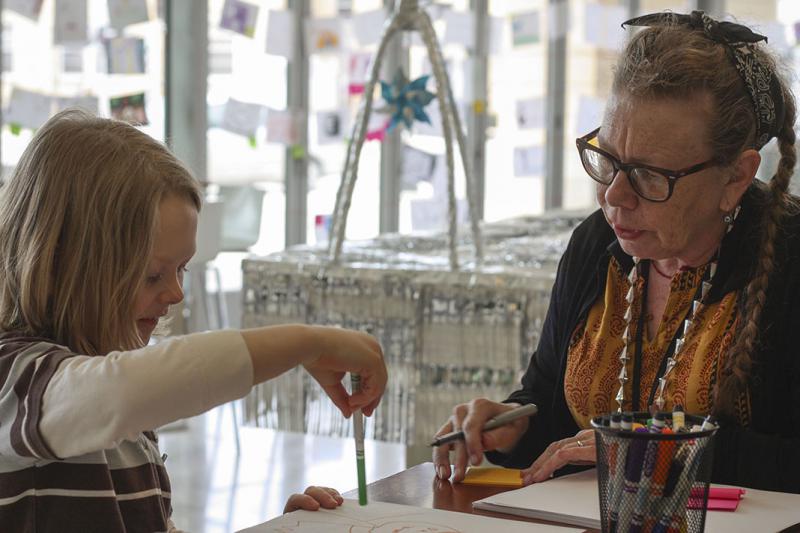Serendip is an independent site partnering with faculty at multiple colleges and universities around the world. Happy exploring!

What will schools be like in 100 years?
Hi everyone!
 I was thinking about the school-drawing prompts from both our group (Just Dewey It) and the group presenting about creativity (CHES)... So this event caught my attention.
I was thinking about the school-drawing prompts from both our group (Just Dewey It) and the group presenting about creativity (CHES)... So this event caught my attention.
I've been following Lynda Barry, an artist/cartoonist/all around awesome person, on Tumblr. She recently hosted a workshop doing something similar to our prompt - but involving kids in the process of imagining. Here are some photos from that event: http://thenearsightedmonkey.tumblr.com/post/47543409124/some-photos-from-the-counter-factual-campus
and here's the poster for the event: http://wid.wisc.edu/content/uploads/2013/03/Drawing-Jam.pdf
Intersections between art, imagination, and planning.. wish I could have gone to this!
Students Face Tougher Test That Outpace Lesson Plans
I have started reading the newspaper more often and I found something really striking today. The article “Students Face Tougher Test That Outpace Lesson Plans” is self-explanatory demonstrates the issues of our current education system. In my field placement, I often do wonder how much of the school’s curriculum really focuses on the children’s individual needs and also considering their limitations. To what extent is the education system really heading towards the right direction especially if these children’s’ lives are affected by early exposure to stressful situations in this vulnerable childhood development period? Perhaps this question hasn’t been addressed in our class. In terms of literacy, are parents really pushing their children to read beyond their level as fast as possible? Where is the value of failures, mistakes and patience?
Fieldnotes 4/12
New Spring term this week. (still working with Ms. A and Ms. B)
4-6 yr olds with Ms. B
9:30-11:30am
New boy, E (now there are two boys in the class)
E and A (girl) go to school together
E seems relaxed, gets to drawing in sketchbook right away, talks with other kids, tells me his full first name, but he goes by the shortened version
Today: Matisse Fishbowl paintings (sketch). Mixed Media, pink paint table and background, tempera paint patterns, tank, etc. Paper leaves and flowers, red tissue paper flowers in background
More planned out than usual, Ms. B mentions to me, I agree, comment that’s especially good for the first day. (she laughs, jokingly offended by my comment…)
Paint for the first half, then wash up
Story and snack: Ms. B reads while I clean up
E doesn’t want to sit during story time (he doesn’t have a snack), seems comfortable (happy?) standing for this time
After story, go to gallery. New show of animal art
Play I Spy (introduce to Eli, he asks and makes sure that everyone gets a chance)
Rather overexcited in the gallery, larger class, moving around a lot, not slowly, hiding things behind pedestals
Back to rom, add paper and tissue paper to paintings. When finished, kids go into other room to play (as usual) Some don’t feel like playing, stay and draw in sketchbooks. One doesn’t want to play or draw, seemed content to sit with us while others drew.

Ch. 1 news
The last time I went to my placement, the students were watching channel 1 news and there was a big focus on the current news with North Korea. Though sometimes this new channel simplifies the news it covers, I felt like they were being really good about not oversimplifying this topic. It was really interesting to see how one student in particular was completely enthralled with it. From my previous conversations with Ms. Morrow, I knew that he had an interest in history but it was cool to see how this could be seen with just how he sat or his repetitive movements stopped because he was so attentive. I was even impressed when he knew answers to questions about North Korea that were not mentioned in the news clip.
I often wish I could see what is going on in the students’ minds since they are so non-vocal. One can see the “gears clicking” when you sit back and observe but I want to know more but I don’t think there is way to do that unless the student was incredibly comfortable with you. But even then, the students don’t say much to Ms. Morrow whom they have known for a long period of time.



